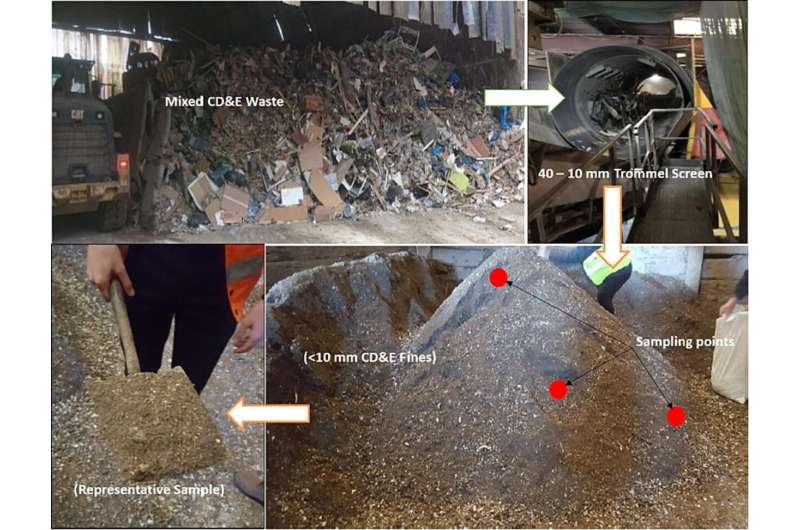This article has been reviewed according to Science X's editorial process and policies. Editors have highlighted the following attributes while ensuring the content's credibility:
fact-checked
trusted source
proofread
How building waste could be used to grow tomatoes

Highly processed building waste, which usually ends up in landfill, can be used to grow tomatoes, a study from the University of Portsmouth has found. The paper is published in Construction and Building Materials.
Construction, demolition and excavation waste is typically processed through a large cylinder drum known as a "trommel." The trommel separates the waste material by size. Anything that's too small for effective recycling is the byproduct left and is known as "trommel fines."
Muhammad Ali, Associate Professor in Materials and Environmental Innovation, conducted a 70-day tomato growth trial, which found that mixing compost with 20% trommel fines provided sufficient nutrients for robust plant and root growth.
Dr. Ali, from the University's School of Civil Engineering and Surveying, said, "A recent government report found the UK annually produced around 222 million tons of waste and 62% of this was construction and demolition waste.
"Trommel fines are less than 10mm in size and consist of small particles of inert and organic materials including soil, crushed rock or concrete, glass, metals, plastics, wood and insulation materials. Currently, there are no markets for this material and it is destined for landfill. But what we've found is that there is potential for trommel fines to be repurposed to benefit various industries, such as horticulture and agriculture."
Dr. Ali and colleagues also tested whether trommel fines could be used in the production of soil blocks to manufacture a variety of earth-based construction materials. The results were promising: The study found that mixing 50% soil with 50% waste to make a compressed earth block only marginally affected its compressive and tensile strengths, compared to soil alone.
Dr. Ali added, "This shows that trommel fines could be integrated into soil compositions for constructions, landscaping, and other applications without compromising structural integrity. Although further research would be needed to improve durability and mechanical properties of compressed earth blocks using trommel fines, one key conclusion drawn from this study is that they have the characteristics of natural materials such as soil and aggregate, and can therefore be treated like them.
"This research not only showcases the potential for trommel fines to divert waste from landfill, promote the circular economy and its environmental impact, but also highlights the remarkable versatility of this often-overlooked byproduct."
The findings open doors to more sustainable construction practices, reduced reliance on traditional resources, and innovative horticultural solutions.
More information: Muhammad Ali, An investigation into the uses of trommel fınes produced from recyclıng of constructıon and demolition waste, Construction and Building Materials (2023). DOI: 10.1016/j.conbuildmat.2023.130579
Provided by University of Portsmouth





















